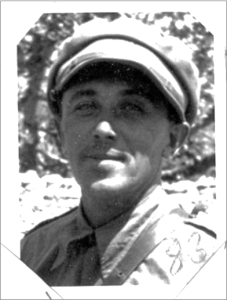HOW I CAME BACK TO THE FRONT By Dusan Kveder
The Spanija series translates select autobiographical accounts by Yugoslavian and Montenegrin volunteers of their actions in the Spanish Civil War. Dr. Ray Hoff used Google Translate from Croatian to English and he edited the selections. As this is a machine translation, the idiomatic features of Croatioan or Serbian and the translation of names and places are “best effort.” The full five-volume collection was entitled The Participants write Spanija 1936-1939: Collection of Memories of Yugoslav Volunteers in the Spanish War. It was assembled by Editor-in-Chief Cedo Kapor and published by the Initiative Committee of the Association of Spanish Fighters, The War History of our Peoples, Book 130, Military Publishing Institute, Belgrade, Yugoslavia, 1971, 5 volumes.
HOW I CAME BACK TO THE FRONT
Dusan Kveder, Spanija, Volume 3, pp. 494-495
During the battle on Morella, I was wounded in the leg by an airplane bomb. I was first evacuated to Benicassim, and a few hours before the Fascists broke out into the sea near Castellon de la Plana, I was transferred to the hospital in Mataro near Barcelona. The medical commission designated me for evacuation from Spain to Romania as unfit for further service at the front. Because of this, I was transferred with the other disabled people to a gathering place near the French-Spanish border, where we waited to go to France. At that time, Rudolf Janhuba, who worked in military censorship in Barcelona, came to us. He was supposed to determine which Yugoslavs were eligible for evacuation on behalf of the personnel department in Barcelona. Since my leg has already recovered a lot, I begged him to fight for me to stay in Spain in every possible way in Barcelona. After a few days, the order arrived that I, as the only disabled person from that group, should return to Barcelona, to work temporarily in the military censorship under Captain Gustinčić. I worked on censorship in the French language department. As I had a constant desire to return to the front, after a few weeks of stay in Barcelona I managed to be sent to the International Brigade reserve center somewhere around
Tarragona. There I met Cukulic and another Czech, whom I knew from the “Dimitrov” Battalion. We practiced intensively in the center, which was difficult for me because of my injured leg (I couldn’t put my shoes on, I was walking in alpargatas). We noticed that units move along the road past the camp and material in the direction of the Ebro and guessed that our troops are preparing an offensive. To the continuous pleas of the three of us (Cukulić, me and one Czech) to send us to the front to the “Batallion Divisionario”, we always received negative answers. That’s why we decided to escape to the front. That’s what we did. After several days of wandering, avoiding controls and legitimization, we found our Battalion. Our Comrades rejoiced with us. The Battalion staff (Major Nikolaidis, a Greek) punished us with a warning, but informed the reserve center that he had kept us at the front, so that we would not be considered deserters there. That’s why we were praised for voluntarily going to the front, and I was there appointed political delegate of the Platoon in the 2nd Company. The Company
Commander was Kosta Nad, Deputy Company Commander Peko Dapčevic, and company Commissar Erdeljac. Soon after, Erdeljac went on leave to Canada, from where he never returned. After his departure, I was appointed Commissar of the Company.

Petar Erdejac
On the Ebro front, our Company held two positions on the river, one immediately above Tortosa, and the other further to the northwest, where we protected the flank of the units that were pushing the Ebro. At Gandesa, in the night attack, Kosta Nad was wounded first, and Peko Dapčević took command of the company. Then Peko Dapčević was wounded, and the Command was taken over by Lieutenant Parnički, who was killed soon after. Of the Officers, I was the only one left with an old injury on my leg and a new wound on my other leg from an artillery shell. In addition, I sprained my leg during the first night raid, so I could barely walk even with a cane.
During the fighting near Gandesa, our company was almost all liquidated. At the beginning of the fighting, there were more than 100 of us soldiers and officers. At the end of the battle, I was the only officer left with 12 soldiers. Everyone else was killed or wounded. Zero Cukulić and the Czech with whom I “deserted” to the front were also killed. Out of about 60-70 Yugoslavs and a couple of other Balkans, in the end there were only two of us left – me and another soldier, from Ličan, from Canada. When we were assigned to the reserve Division, we were joined there by several more lightly wounded Comrades and others employed in the rear units. From there we were evacuated from the front to Ameta del Mar.
1 About this inscription, Ales Bebler gives the following explanation: In the documents about the participation of our volunteers in the Spanish war, there was a note entitled “ADDENDUM OF INFORMATION ON THE DIVISIONARIO BATTALION”, signed: Dušan Kveder , Under this humble the letter hides a shocking document about the fate and behavior of our fighters in Spain, and especially about Dušan Kveder Tomaž himself, the later heroic Partisan Commissar and Commander, the closest associate of Commander Stanet and his successor, the last commander of the Main Staff of NOV Slovenia. The note is published exactly as was written, only the title was changed.












